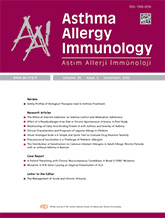


Objective: The distribution of sensitization to inhalant allergens differs in every region of Turkey. This study aimed to determine the sensitization rates of common inhalant allergens in adult allergic rhinitis (AR) patients with/without asthma in Batman.
Materials and Methods: A total number of 260 AR patients with or without asthma who presented to the outpatient clinic of Adult Immunology and Allergy between April 2021 and May 2022 were retrospectively evaluated. The demographic, clinical and laboratory features such as skin prick test (SPT) results, eosinophil counts (n/mm3), basophil counts (n/mm3), Neutrophil/Lymphocyte ratio (NLR), Platelet/Lymphocyte ratio (PLR), total Ig-E and specific Ig-E levels were analyzed. The parameters were compared between the subjects who have mild and moderate/severe AR.
Results: The mean age was 31.9±9.7 years and more than half (62.5%) were female. When assessed separately, the most common inhalant allergens were Dermatophagoides (D.) farinae (n=128, 49.2%), Grass mix (n=119, 45.8%), Grass-cereal mix (n=112, 43.1%), D. pteronyssinus (n=94, 36.2%), Cockroach (n=77, 29.6%), Weed mix (n=57, 21.9%) and Aspergillus fumigatus (n=35, 13.5%), respectively. Additionally, the most common tree pollen allergen was Olive tree pollen (n=26, 10%), and the frequency of sensitization to Olive tree pollen was higher in moderate/severe (n=215, 82.7%) AR patients than in mild (n=45, 17.3%) ones (p=0.039).
Conclusion: This study demonstrated that pollen sensitization was the most commonly detected one when the sensitizations were assessed in general, and it was followed by house dust mite, cockroach, animal epithelium and mold sensitizations. Also, Olive tree pollen was the most common tree pollen allergen in Batman.